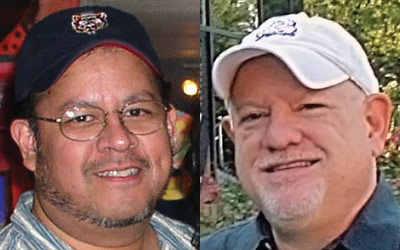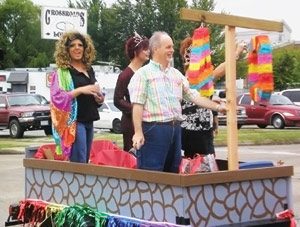Council approves higher fees, new rules on outdoor events, but attorney says city plans to ‘phase in’ enforcement to lessen impact
DAVID TAFFET | Staff Writer taffet@dallasvoice.com
The Fort Worth City Council has enacted a new outdoor event ordinance that changes requirements and increases fees for some outdoor events.
The changes, which go into effect Oct. 1, could impact future Tarrant County Gay Pride parades and picnics held in October each year, and it could also affect the Tarrant County AIDS Outreach Center’s AIDS Walk, held each spring.
Senior Assistant City Attorney Sarah Fullenwider acknowledged that fees for such events were increased, but the rest of the ordinance is primarily about codifying rules already in place.
“We took current policy and put it into an ordinance,” Fullenwider said.
She noted that the ordinance “doesn’t apply to First Amendment activity,” but that it does require organizers give the city at least 48 hours’ notice for an event that will close a street.
First Amendment activities refer to protests or other gatherings that are political in nature and involve exercising free speech rights.
The new Fort Worth requirements are for events that expect 500 or more participants and spectators. In Dallas, permits are required for 75 or more people.
The fee in Dallas is on a graduated scale based on number of expected attendees. For more than 20,000 expected attendees, such as the Alan Ross Texas Freedom Parade, the city charges $500, plus a late fee for applications received less than 45 days before an event.
Fort Worth will now require event planners to attend a calendar committee meeting. To provide enough police protection, the city is trying to prevent overlapping scheduling.
Organizers must also attend a pre-event meeting and submit a traffic plan if streets are to be closed, Fullenwider said.
Special rules apply to downtown, the Stockyards and the Near South Side, which includes the area where Fort Worth’s annual Pride parade is held.
Fullenwider said there was no request from the Museum District for any special consideration, probably because events there do not affect the surrounding neighborhoods to the same extent.
Walks, runs and races have some special rules. Normally, all business and homeowners in the affected area need to be notified that an event will take place in front of their property.
For longer routes, area property owners may be notified by e-mail, signs, mail or newspaper ads.
Fees, which are currently $150 will not rise immediately, and Fullenwider said officials have not yet determined what the new fees will be.
She did note, however, that the city is aware of the effect increased costs can have on organizations.
She said that officials are talking about phasing in any eventual increase.
Tony Coronado of the Tarrant County Gay Pride Week Association said his organization isn’t sure yet how the new ordinance might affect the Pride Week events. But so far, he added, he hasn’t seen any big changes
In the past, Fort Worth’s annual Pride Picnic was considered a private event that was permitted through the parks department. Because of its size, it would now be considered a public event and require a city permit as well, Coronado said.
Coronado said that a large expense for the parade is hiring extra off-duty police officers.While the number of streets to be closed has not changed, he said the number of entries could affect the number of officers needed.
The parade this year will be held on Oct. 3, after the ordinance takes effect. But permits are already in place and Coronado said he has already met with the police department.
One change in this year’s parade will be a block party that will be held at Pennsylvania and South Jennings streets. A block in each direction from the intersection will be closed all day.
That required extra coordination with the city, Coronado said, but the new ordinance presented no obstacles.
However, by next year, higher fees may be in place. If that happens, Coronado said, “We’ll just have to bump it up.”
AIDS Outreach Center Executive Director Allan Gould said the new ordinance will affect several events benefiting his organization, including the annual AOC AIDS Walk next spring and the Lone Star Ride Fighting AIDS next month.
“We’ll have new due diligence on our part” to make sure the proper permits are in place, Gould said.
While this year’s Lone Star Ride happens before the new ordinance goes into the effect, if the bike ride follows the same route next year, fees will be higher and organizers will have to follow new rules about notifying everyone along the course.
The AIDS walk would also be subject to higher fees, which Gould said he hoped the city would consider waiving for fundraising events for local nonprofit organizations.
Gould said a bigger factor was that the walk is in the museum district, as is Artists Against AIDS, and the free lot outside the Community Arts Center has recently become paid parking.
Gould said hoped that wouldn’t have a negative impact on participation.
But he said AOC has been considering several solutions, including moving events out of the city or to a large, private downtown venue such as the Tandy Center.
Fort Worth Councilmember Joel Burns said that a mandatory insurance ordinance was passed last year that goes into effect at the same time. He said the new rules, however, shouldn’t materially impact neighborhood or LGBT groups.
“My hope is they’d be even better,” Burns said.
He said he thought the new ordinance would help police and city staff coordinate with groups and help make events safer.
“We held five public meetings,” Fullenwider said. “We’re hoping we did a good job. In a year, we plan to meet with event holders and see how it’s working.”
This article appeared in the Dallas Voice print edition August 20, 2010.

















